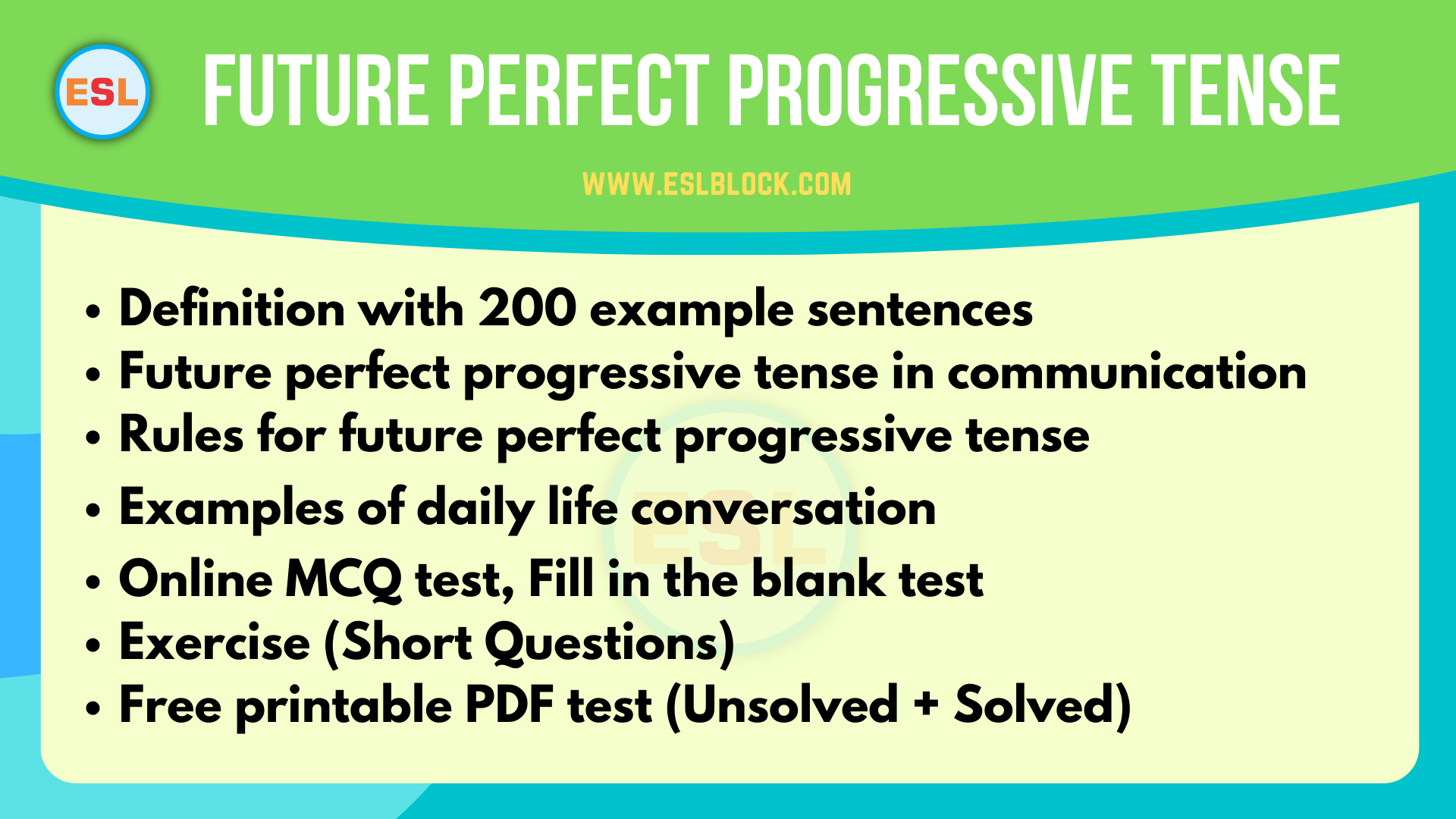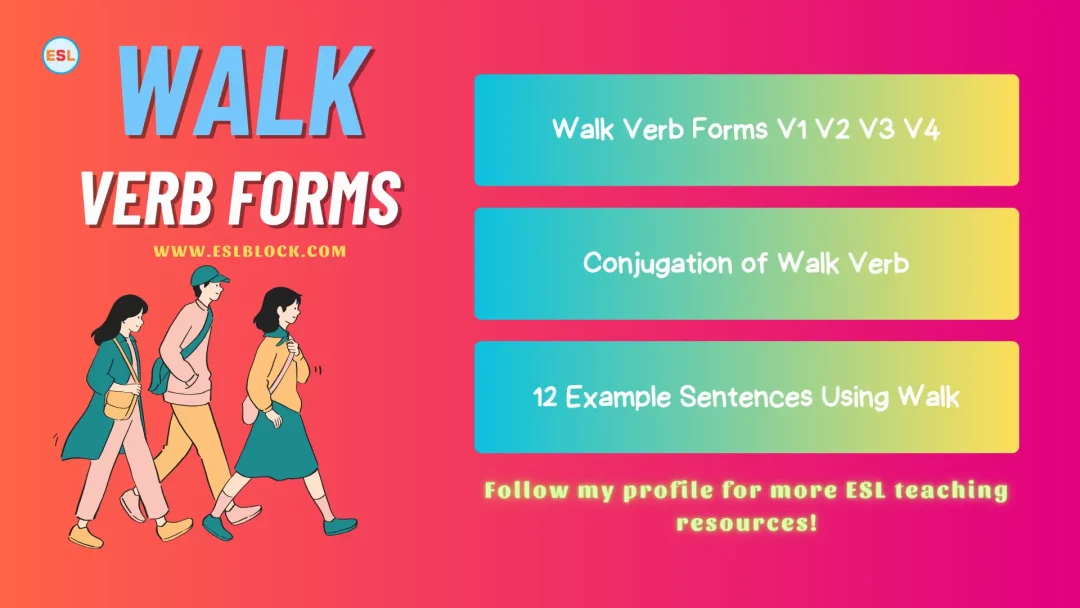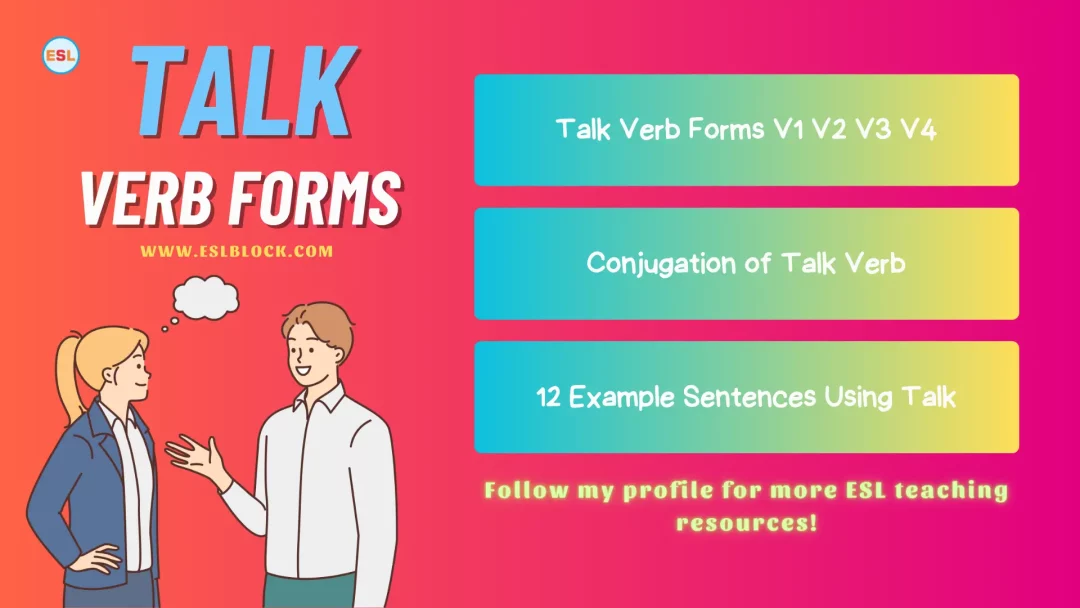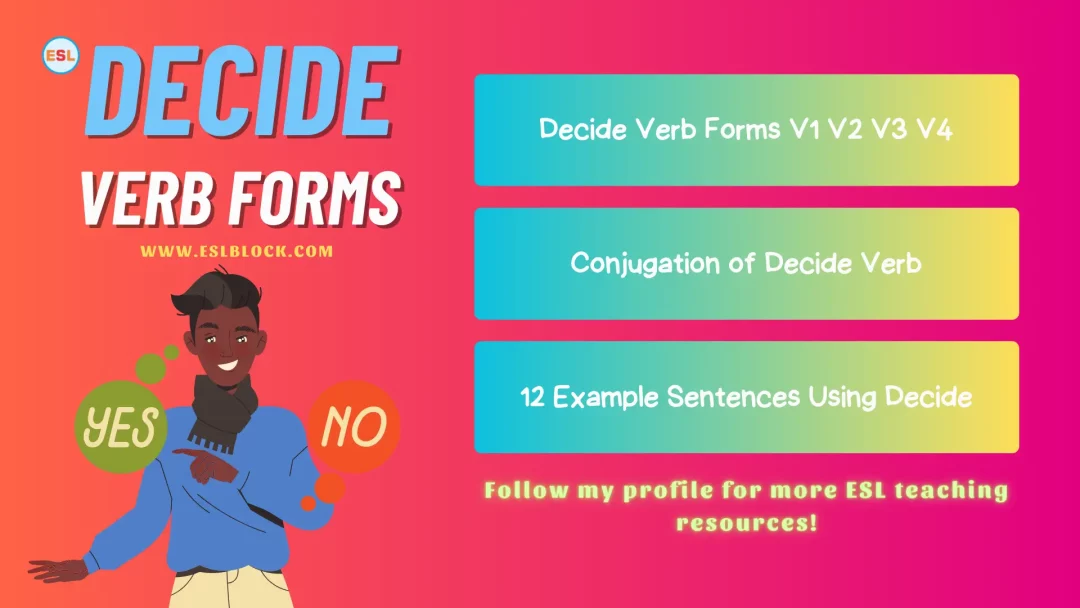Future Perfect Progressive Tense Definition With Examples

![]()
The future perfect progressive tense is also known as the future perfect continuous tense. The future perfect progressive tense is a grammatical construction used to describe an action that will be in progress at a specific point in the future. It is formed by using the auxiliary verb “will” followed by the present participle of the main verb, “be,” and the present participle of the main verb.
For example, “I will have been studying for three hours by the time you arrive.”
The future perfect progressive tense is used to express the duration of an action that will have taken place in the future. It is used to describe an action that will have been in progress for a certain amount of time at a specific point in the future. This can be used to express plans, predictions, or assumptions about future events.
Understanding the future perfect progressive tense is crucial for proper communication in the English language. It is a complex grammatical structure that is often used in academic and professional settings, and mastering it can greatly enhance one’s ability to express themselves clearly and accurately.
Additionally, understanding the future perfect progressive tense can also aid in understanding other tenses and grammar structures, and improve overall proficiency in the English language.
Read also: Personal Injury Lawyer Greenville NC
Read also: Types of Sentences Worksheets
How to form Future Perfect Progressive Tense?
To form the Future Perfect Progressive Tense, we use the auxiliary verb “will” followed by the present participle of the verb “have” and then the present participle of the main verb. For example, “I will have been studying for three hours by the time you arrive.”
The structure of the Future Perfect Progressive Tense is: Subject + will + have + been + present participle of the main verb.
It’s important to remember that this structure is used to describe an action that will have been in progress for a certain amount of time at a specific point in the future.
Rules for affirmative sentences
When constructing affirmative sentences in the future perfect progressive tense, it’s important to use the correct subject-verb agreement and to correctly form the verb tense.
- I will have been studying for three hours by the time you arrive.
- They will have been working on this project for two weeks by next Monday.
- We will have been living here for five years next month.
- He will have been playing the guitar for an hour by the time she arrives.
- She will have been writing a novel for two years by next summer.
- It will have been snowing for three days by the end of the week.
- You will have been running for 45 minutes by the time I finish my workout.
- They will have been traveling for a month by the time they return home.
- I will have been reading this book for a week by the time I finish.
- He will have been cooking for an hour by the time we arrive.
Rules for negative sentences
To form negative sentences in the future perfect progressive tense, we use the word “not” after the auxiliary verb “will” and before the present participle of the verb “have.” Examples:
- I will not have been studying for three hours by the time you arrive.
- They will not have been working on this project for two weeks by next Monday.
- We will not have been living here for five years next month.
- He will not have been playing the guitar for an hour by the time she arrives.
- She will not have been writing a novel for two years by next summer.
- It will not have been snowing for three days by the end of the week.
- You will not have been running for 45 minutes by the time I finish my workout.
- They will not have been traveling for a month by the time they return home.
- I will not have been reading this book for a week by the time I finish.
- He will not have been cooking for an hour by the time we arrive.
Rules for interrogative sentences
To form interrogative sentences in the future perfect progressive tense, we place the auxiliary verb “will” before the subject of the sentence and use the word “have” before the present participle of the main verb. Examples:
- Will I have been studying for three hours by the time you arrive?
- Will they have been working on this project for two weeks by next Monday?
- Will we have been living here for five years next month?
- Will he have been playing the guitar for an hour by the time she arrives?
- Will she have been writing a novel for two years by next summer?
- Will it have been snowing for three days by the end of the week?
- Will you have been running for 45 minutes by the time I finish my workout?
- Will they have been traveling for a month by the time they return home?
- Will I have been reading this book for a week by the time I finish?
- Will he have been cooking for an hour by the time we arrive?
Short Paragraphs for using the Future Perfect Progressive Tense
Paragraph 1: By the time the concert starts, I will have been practicing the piano for six hours. I am determined to perform flawlessly and have been dedicating all my free time to perfecting my skills. I am confident that my hard work will pay off when I take the stage.
Paragraph 2: When the sun rises tomorrow, the construction workers will have been building the new bridge for 12 hours straight. They have been working tirelessly to complete the project on schedule, and despite the challenges they have encountered, they are determined to finish on time.
Paragraph 3: By next month, my little brother will have been learning to play the guitar for a year. He has been making great progress and has already mastered several songs. I am impressed by his dedication and look forward to hearing him play in the future.
Paragraph 4: When the semester ends, I will have been studying for my final exams for three weeks straight. I have been putting in long hours at the library and have been making sure to stay focused and on task. I am confident that all my hard work will pay off when I receive my grades.
Paragraph 5: By the time the marathon starts, the runners will have been preparing for months. They have been training hard, running long distances, and pushing themselves to their limits. They are determined to finish the race and have been putting in the time and effort to make that happen. Their dedication and hard work will be on full display as they cross the finish line.
Examples of Future Perfect Progressive Tense in everyday situations
- By the time the party starts, I will have been cooking for hours.
- She will have been studying for the exam for a week by tomorrow.
- He will have been playing video games for three hours by the time his parents come home.
- They will have been working on the project for a month by next week.
- We will have been traveling for two weeks by the time we reach Hawaii.
- I will have been running for an hour by the time I finish my morning routine.
- He will have been writing his novel for a year by next month.
- She will have been practicing yoga for three months by the end of the year.
- By the time the movie ends, I will have been watching it for two hours.
- You will have been waiting for me for half an hour by the time I arrive.
- I will not have been sleeping for more than 4 hours when my alarm goes off.
- They will not have been working together for long before they start to disagree.
- We will not have been living in this city for a year until next month.
- He will not have been playing the guitar for more than an hour when his friends arrive.
- She will not have been writing her book for more than a month when she finishes it.
- Will I have been working for 8 hours by the time I finish my shift?
- Will he have been playing soccer for 2 hours by the time the game starts?
- Will they have been studying for the exam for more than a week by next Monday?
- Will you have been waiting for me for more than an hour by the time I arrive?
- Will she have been practicing her dance routine for 2 hours by the time the audition starts?
- By the time the concert starts, John will have been practicing the guitar for hours.
- By the time the flight lands, Sarah will have been traveling for 13 hours.
- Michael will have been running for an hour by the time he finishes his morning routine.
- By the time the movie ends, Jane will have been watching it for 2 hours.
- I will not have been working for more than 8 hours when my shift ends.
- They will not have been living in this city for a year until next month.
- Will I have been sleeping for more than 4 hours when my alarm goes off?
- Will you have been waiting for me for more than an hour by the time I arrive?
- Will he have been playing video games for 2 hours by the time his parents come home?
- Will she have been practicing yoga for 3 months by the end of the year?
- By the time the party starts, I will have been cooking for hours.
- She will have been studying for the exam for a week by tomorrow.
- He will have been playing video games for 3 hours by the time his parents come home.
- They will have been working on the project for a month by next week.
- We will have been traveling for 2 weeks by the time we reach Hawaii.
- I will have been running for an hour by the time I finish my morning routine.
- He will have been writing his novel for a year by next month.
- She will have been practicing yoga for 3 months by the end of the year.
- By the time the movie ends, I will have been watching it for 2 hours.
- You will have been waiting for me for half an hour by the time I arrive.
- By the time the concert starts, Emma will have been rehearsing for hours.
- By the time the flight lands, Ryan will have been traveling for 13 hours.
- By the time the game starts, Alex will have been preparing for weeks.
- By the time the show ends, Karen will have been watching it for 2 hours.
- I will not have been working on this project for more than a month when it’s due.
- They will not have been living in this house for a year until next month.
- Will I have been sleeping for more than 4 hours when my alarm goes off?
- Will you have been waiting for me for more than an hour by the time I arrive?
- Will he have been playing video games for 2 hours by the time his parents come home?
- Will she have been practicing yoga for 3 months by the end of the year?
- By the time the party starts, I will have been cleaning for hours.
- She will have been studying for the exam for a week by tomorrow.
- He will have been playing video games for 3 hours by the time his friends arrive.
- They will have been working on the project for a month by next week.
- We will have been traveling for 2 weeks by the time we reach our destination.
- I will have been running for an hour by the time I finish my morning routine.
- He will have been writing his novel for a year by next month.
- She will have been practicing yoga for 3 months by the end of the year.
- By the time the movie ends, I will have been watching it for 2 hours.
- You will have been waiting for me for half an hour by the time I arrive.
- By the time the concert starts, Jack will have been rehearsing for hours.
- By the time the flight lands, Emily will have been traveling for 13 hours.
- By the time the game starts, David will have been preparing for weeks.
- By the time the show ends, Sarah will have been watching it for 2 hours.
- I will not have been working on this project for more than a month when it’s due.
- They will not have been living in this house for a year until next month.
- Will I have been sleeping for more than 4 hours when my alarm goes off?
- Will you have been waiting for me for more than an hour by the time I arrive?
- Will he have been playing video games for 2 hours by the time his friends arrive?
- Will she have been practicing yoga for 3 months by the end of the year?
- By the time the party starts, I will have been preparing for hours.
- She will have been studying for the exam for a week by tomorrow.
- He will have been playing video games for 3 hours by the time his parents come home.
- They will have been working on the project for a month by next week.
- We will have been traveling for 2 weeks by the time we reach our destination.
- I will have been running for an hour by the time I finish my morning routine.
- He will have been writing his novel for a year by next month.
- She will have been practicing yoga for 3 months by the end of the year.
- By the time the movie ends, I will have been watching it for 2 hours.
- You will have been waiting for me for half an hour by the time I arrive.
- Will we have been planning for the party for more than a month by the time it starts?
- Will they have been working on the project for 2 weeks by next Monday?
- Will he have been playing video games for 3 hours by the time his friends arrive?
- Will she have been practicing yoga for 3 months by the end of the year?
- I will not have been sleeping for more than 4 hours when my alarm goes off.
- They will not have been living in this city for a year until next month.
- By the time the concert starts, my sister will have been rehearsing for hours.
- By the time the flight lands, my friend will have been traveling for 13 hours.
- By the time the game starts, my brother will have been preparing for weeks.
- By the time the show ends, my mom will have been watching it for 2 hours.
- I will not have been working on this project for more than a month when it’s due.
- They will not have been living in this house for a year until next month.
- Will I have been sleeping for more than 4 hours when my alarm goes off?
- Will you have been waiting for me for more than an hour by the time I arrive?
- Will he have been playing video games for 2 hours by the time his parents come home?
- Will she have been practicing yoga for 3 months by the end of the year?
- By the time the party starts, my friends will have been preparing for hours.
- She will have been studying for the exam for a week by tomorrow.
- He will have been playing video games for 3 hours by the time his friends arrive.
- They will have been working on the project for a month by next week, but will they have finished it by then?
Questions and answers about future perfect progressive tense
Q: What is the future perfect progressive tense used for?
A: The future perfect progressive tense is used to describe an action that will have been in progress for a certain amount of time at a specific point in the future.
Q: How do you form the future perfect progressive tense?
A: To form the future perfect progressive tense, we use the auxiliary verb “will” followed by the present participle of the verb “have” and then the present participle of the main verb.
Q: What is the structure of the future perfect progressive tense?
A: The structure of the future perfect progressive tense is: Subject + will + have + been + present participle of the main verb.
Q: How do you form negative sentences in the future perfect progressive tense?
A: To form negative sentences in the future perfect progressive tense, we use the word “not” after the auxiliary verb “will” and before the present participle of the verb “have.”
Q: How do you form interrogative sentences in the future perfect progressive tense?
A: To form interrogative sentences in the future perfect progressive tense, we place the auxiliary verb “will” before the subject of the sentence and use the word “have” before the present participle of the main verb.
Q: Can you give an example of a sentence in the future perfect progressive tense?
A: By next week, I will have been studying for the exam for two weeks.
Q: How does the future perfect progressive tense differ from the future perfect tense?
A: The future perfect progressive tense describes an action that will have been in progress, while the future perfect tense describes an action that will have been completed by a certain point in the future.
Q: How is the future perfect progressive tense used in everyday conversation?
A: The future perfect progressive tense is often used to describe plans or actions that will have been in progress for a certain amount of time at a specific point in the future, such as “By the time the concert starts, I will have been practicing the piano for six hours.”
Q: Can you give an example of an interrogative sentence in the future perfect progressive tense?
A: Will they have been working on the project for two weeks by next Monday?
Q: Can you give an example of a negative sentence in the future perfect progressive tense?
A: I will not have been sleeping for more than 4 hours when my alarm goes off.
Fill in the blank questions about future perfect tense
- By the time the movie ends, I ____________ have been watching it for 2 hours or will not have been watching it for 2 hours.
- Will they ____________ have been living in this city for a year by next month or will not have been living in this city for a year by next month.
- By next week, I ____________ have been studying for the exam for two weeks or will not have been studying for the exam for two weeks.
- Will you ____________ have been waiting for me for more than an hour by the time I arrive or will not have been waiting for me for more than an hour by the time I arrive.
- By the time the party starts, my friends ____________ have been preparing for hours or will not have been preparing for hours.
- Will I ____________ have been sleeping for more than 4 hours when my alarm goes off or will not have been sleeping for more than 4 hours when my alarm goes off.
- By the time the flight lands, my friend ____________ have been traveling for 13 hours or will not have been traveling for 13 hours.
- Will she ____________ have been practicing yoga for 3 months by the end of the year or will not have been practicing yoga for 3 months by the end of the year.
- By the time the game starts, my brother ____________ have been preparing for weeks or will not have been preparing for weeks.
- Will they ____________ have been working on the project for a month by next week or will not have been working on the project for a month by next week.
Answer:
- By the time the movie ends, I will have been watching it for 2 hours.
- Will they will not have been living in this city for a year by next month.
- By next week, I will have been studying for the exam for two weeks.
- Will you have been waiting for me for more than an hour by the time I arrive.
- By the time the party starts, my friends will have been preparing for hours.
- Will I will not have been sleeping for more than 4 hours when my alarm goes off.
- By the time the flight lands, my friend will have been traveling for 13 hours.
- Will she will not have been practicing yoga for 3 months by the end of the year.
- By the time the game starts, my brother will have been preparing for weeks.
- Will they will not have been working on the project for a month by next week.
Conclusion
In conclusion, the future perfect progressive tense is an important aspect of English grammar that allows us to describe actions that will have been in progress for a certain amount of time at a specific point in the future.
It is important to understand how to form, structure, and use the future perfect progressive tense in both affirmative, negative and interrogative sentences. With practice and usage, one can become proficient in using the future perfect progressive tense in their communication, making it more precise and clear.
Understanding and using the future perfect progressive tense can be applied in everyday situations, from planning an event or a trip, to describing one’s daily routine.
Practice using the future perfect progressive tense in different contexts and situations will help to improve proficiency with it.
If you have enjoyed “future perfect progressive tense,” I would be very thankful if you’d help spread it by emailing it to your friends or sharing it on Twitter, Instagram, Pinterest, or Facebook. Thank you!
With ESLBLOCK, you will study with new ideas. If you doubt the qualities of the future perfect progressive tense, reach us through our blog’s comment section. Keep checking back! We’ll do our best to give you feedback as soon as possible. Thank you!
Related Articles
Here are some more lists for you!
- List of Fish: Types of Fish with Interesting Facts and Pictures
- List of Mollusks | Types of Mollusks with Interesting Facts
- List Of Farm Animals: Different Types of Farm Animals
- Shellfish | List of Shellfish with Interesting Facts






